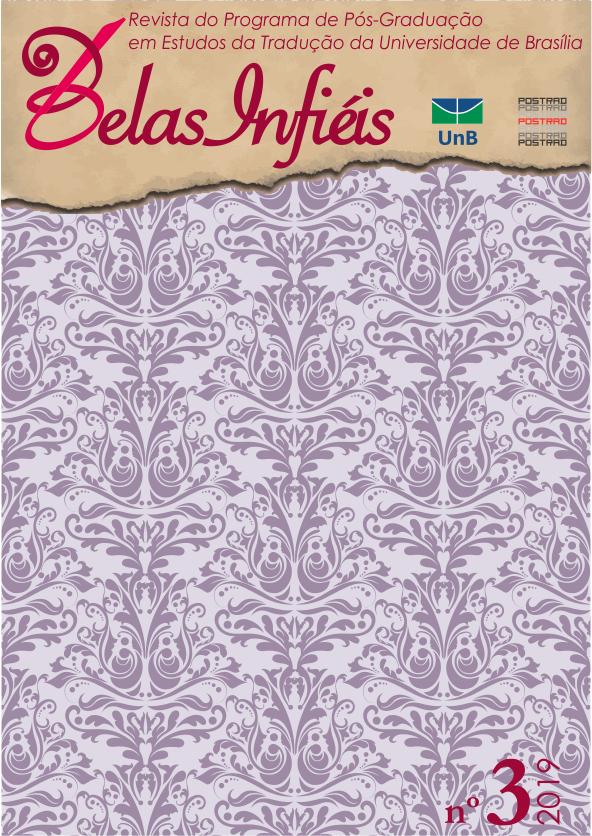A literatura infantojuvenil e as amarras da literatura: arte com funcionalidade
DOI:
https://doi.org/10.26512/belasinfieis.v8.n3.2019.23132Palabras clave:
Estudos Descritivos da Tradução. Reescrita. Tradução e Adaptação. Literatura infantojuvenil traduzida.Resumen
Informado pelos Estudos Descritivos da Tradução, este artigo problematiza algumas questões centrais para a literatura infantojuvenil (LIJ) e para a reescrita desse tipo de literatura. Com base na noção de reescrita de André Lefevere e no entendimento de que aspectos ideológicos e poetológicos condicionam a publicação de obras literárias, discute-se o caráter teleológico da LIJ, bem como as imposições de ordem cultural, ideológica ou mercadológica que podem interferir na criação da LIJ ou da literatura em geral. Considera-se que para a compreensão dos fenômenos tradutórios em dada cultura meta faz-se necessário analisar, além de aspectos literários, as condicionantes particulares dessa cultura, observando especialmente as propostas ou concepções de literatura e de sociedade por parte daqueles que atuam no processo de elaboração e difusão das reescritas. Observa-se ainda que diferentes perspectivas ideológicas e poetológicas podem ser entrevistas não somente na diacronia que separa as reescritas mais antigas das contemporâneas, mas também as reescritas publicadas em um mesmo momento histórico poderão apresentar propostas distintas, as quais são concretizadas, por meio de estratégias tradutórias, na própria reescrita, no modo de reler o Outro. Para isso, o artigo ilustra com exemplos concretos a discussão teórica apresentada, sendo abordados casos de projetos tradutórios em sistemas literários distintos, especificamente, Estados Unidos, Polônia e Brasil. Ao discutir as implicações de uma “literatura para” e abordar as fronteiras porosas entre os termos usualmente utilizados na reescrita de LIJ (tradução, adaptação, história recontada), este trabalho objetiva abordar a complexidade da LIJ quanto a sua própria definição e as suas formas de apresentação em detrimento de perspectivas que inserem a LIJ em uma posição de inferioridade ou à margem da literatura.
Descargas
Descargas
Publicado
Cómo citar
Número
Sección
Licencia
Copyright Statement
Given the public access to this journal, the texts are free to use but requires the recognition of the original authorship and initial publication in this journal to be properly stated.
The journal allows the use of works published for non-commercial purposes, including the right to submit the work to publicly accessible databases. Published contributions are the sole and exclusive responsibility of the author(s).
- When submitting papers to be evaluated by the Belas Infiéis journal, the author(s):
- Declare that the contents of the contributions are original and of their original creation, being entirely responsible for their content if there is an objection by third parties.
- Claim to be aware that they should not commit academic plagiarism.
- Declare that the manuscript has not been published, completely or partially, in Portuguese or another language. If it is a translation it should be submitted to the Translated Articles section.
- Declare that the manuscript is not being evaluated by other journals.
- Declare that the manuscript was not submitted to another journal simultaneously.
- Commit(s) to inform the journal of any kind of error or inaccuracy in their contribution (published, in evaluation or in editing) and to collaborate with the editors to make due corrections of the article (when in evaluation or editing) or erratum/retraction (after publication).
- Declare that there is no conflict of interest regarding the published work.
- Authorize its release if it is accepted for publication without any kind of monetary compensation.
- Agree to assign non-exclusive rights to publication to the magazine, remaining free to make their contribution available in other media as long as the publication of the first version in Belas Infiéis magazine is mentioned. They also authorize Belas Infiéis to assign their texts for reproduction in content indexers, virtual libraries and similar platforms.
- Maintain copyright and grant the journal the right of first publication, the work being licensed under theCreative Commons Attribution License.
- Is/Are allowed and encouraged to publish and distribute their work online after the editorial process, which may increase the impact and citation of the published work.
- Authorize the editorial team to make textual adjustments and to adapt the article to the publication rules, when necessary.



















